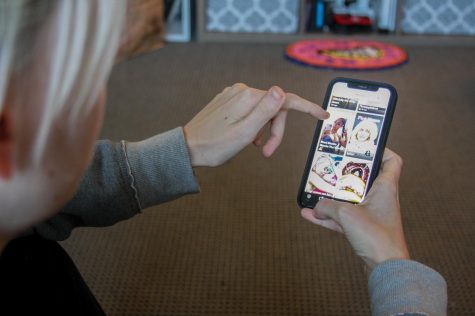B.L. v Mahanoy and free speech off campus
How the verdict of a Supreme Court case could affect student’s free speech rights
May 12, 2021

In 2017, Brandi Levy was rejected from the varsity cheerleading team at Mahanoy Area High School in Pennsylvania, and was instead placed on the junior varsity team. Upset and angry, Levy posted on her Snapchat story “f*ck school f*ck softball f*ck cheer f*ck everything.” The next day she was suspended from the cheer team altogether.
On behalf of their daughter, Levy’s parents sued MAHS claiming the suspension was a violation of her First Amendment rights. Four years later, on April 28, Levy’s case was argued by the Supreme Court. The decision is expected to be announced later this year.
The outcome of this case could determine whether public schools can punish students for content they post online while off campus. In a related 1969 Supreme Court case, Tinker v. Des Moines Independent Community School District, the Court ruled that public schools may punish a student for their speech if it “materially and substantially disrupts the work and discipline of the school.”
Of course, SPU is a private religious university, not a public high school, which means administration already plays by different rules.
Dr. Brett Johnson, a Professor at the Missouri School of Journalism, stated that private universities, especially religious ones like SPU, have more power over the boundaries of acceptable speech for their students than public universities do.
Johnson explained that public universities function as a voice of the state, and therefore cannot punish students purely for their speech, as it would violate their first amendment. However, they can get around this stipulation in other ways.
“For example, they can restrict giving official status to student groups because these groups are said to reflect the university. Public universities can also place restrictions on the time, place, and manner in which students can speak. Usually, this is done through establishing which places on campus are considered public forums where anyone can speak,” he said.
However, because SPU is not a public institution, administration also has the ability to enforce different kinds of rules that a secular university would be unable to.
SPU has what is known as a ministerial exception, which is a legal doctrine that allows SPU to maintain certain religion based policies that public universities can not. For example, SPU’s Standards of Conduct states that students can not cohabitate with romantic partners. The University of Washington could not hold their students to this rule.
SPU communication professor Sara Shaban explained that because SPU is a religious institution, what students can and can not be punished for saying is also different than it would be at a secular university.
“If somebody said, ‘you’re going to hell because you’re gay’, that could be considered hate speech in one space, but it within the space of a private Christian institution under the free Methodist Church, that wouldn’t necessarily be considered hate speech,” Shaban explained.
Although there are certain things that set public and private universities apart, they follow similar rules when it comes to censoring students.
“If [students] can be censored in public schools then they sure can be censored in private schools,” Shaban said.
Therefore, if the Supreme Court rules in favor of the Mahanoy Area School District it would become legal for public institutions to police what their students post on social media, and in turn would allow private institutions to do the same.
Whether public or private, freshman sociology major Emily Blue doesn’t think any university should be able to punish students for what they say off campus.
“I think the whole thing of schools regulating what people post on social media is ridiculous. People are more than just students and they deserve to have lives outside of work and school without being punished,” she said.


























































































